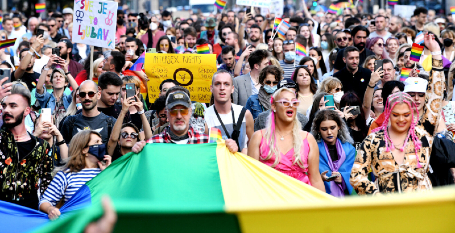Serbian President Aleksandar Vucic has said September's EuroPride parade in Belgrade will not go ahead.
Mr Vucic's announcement comes after thousands of people marched in protest against the event earlier this month.
The president said he was not happy with the decision, but that Serbia had to concentrate on other issues, including trouble in Kosovo.
The parade organisers have said the parade will go ahead anyway, with any ban "illegal".
The international LGBT pride parade has been hosted in a different European city most years since 1992.
During a news conference, Mr Vucic said this year's event - scheduled to take place between 12 and 18 September - would be "postponed or cancelled" because of "recent tensions with its former province Kosovo", as well as issues around energy and food.
"Simply, at some point, you can't handle everything," he said. "In an another time, a happier one [the event could take place]."
Kosovo: Why is trouble flaring up again?
Serbia-Kosovo ID document row settled, says EU
In response, EuroPride 2022 organiser Marko Mihailovic said "the state cannot cancel EuroPride" and any attempt to do so would be a "clear breach of the constitution".
Kristine Garina, president of the European Pride Organisers Association - responsible for licensing EuroPride - insisted the event would not be cancelled.
She added that Prime Minister Ana Brnabic - Serbia's first female and openly gay PM - promised full support from the Serbian government during the bidding process for EuroPride 2022, and she expects "that promise to be honoured".
Earlier this month, thousands of people marched in Belgrade against EuroPride, holding signs that read "to protect the family" and "keep your hands off our children".
Far-right parties have condemned the event, and Bishop of Banat, Nikanor, from the Serbian Orthodox Church, said he would "curse all those who organise and participate in something like that".
Event organisers said Serbia's role as a host of EuroPride was "an important step along the path toward achieving equality for the LGBTI+ community in the Western Balkans".
In 2010, anti-gay protesters fought running battles with police in an effort to disrupt a Gay Pride march in Belgrade. The march returned four years later, with huge security.
Serbian President Aleksandar Vucic has said September's EuroPride parade in Belgrade will not go ahead.
Mr Vucic's announcement was made after thousands of people marched in protest against the event earlier this month.
The president said he was not happy with the decision, but that Serbia had to concentrate on other issues, including trouble in Kosovo.
The parade organisers have said the parade will go ahead anyway, with any ban "illegal".
EuroPride is an international LGBTQ pride parade - it's been hosted in a different European city most years since 1992.
During a news conference, Mr Vucic said this year's event - scheduled to take place between 12 and 18 September - would be "postponed or cancelled" because of "recent tensions with its former province Kosovo", as well as issues around energy and food.
EuroPride 2022 organiser Marko Mihailovic said "the state cannot cancel EuroPride" and any attempt to do so would be a "clear breach of the constitution".
Kristine Garina, president of the European Pride Organisers Association - responsible for licensing EuroPride - insisted the event would not be cancelled.
What's life like for LGBTQ people in Serbia?
What’s life like for LGBTQ people in Serbia? Let’s take a look at some of the key equality indicators.
Is homosexuality legal in Serbia?
Yes.The history of Serbia is fairly complex, but in simple terms homosexuality was decriminalised in 1994.
Are there anti-discrimination protections in place for LGBTQ people in Serbia?
Yes. Comprehensive anti-discrimination protections came into effect in 2009.
Is there Marriage Equality in Serbia?
No. There is no legal recognition of same-sex relationships in Serbia. The constitution explicitly limits marriage to opposite-sex couples.
What’s life like for LGBTQ people in Serbia?
Serbia is a socially conservative country, and homophobia remains widespread.

